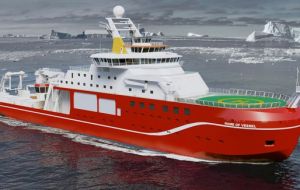MercoPress. South Atlantic News Agency
UK's Cammell Laird will build BAS new £200 million polar research ship
 Cammell Laird chief executive, John Syvret CBE, met with NERC chief operating officer Paul Fox (L) to seal the deal in Birkenhead
Cammell Laird chief executive, John Syvret CBE, met with NERC chief operating officer Paul Fox (L) to seal the deal in Birkenhead  Cammell Laird is expected to cut steel in June 2016 and deliver the next-generation polar research vessel ready for operation by 2019.
Cammell Laird is expected to cut steel in June 2016 and deliver the next-generation polar research vessel ready for operation by 2019.  The ship, the first British-built polar research vessel with a helideck, will be one of the most sophisticated floating research laboratories working in polar regions.
The ship, the first British-built polar research vessel with a helideck, will be one of the most sophisticated floating research laboratories working in polar regions.  NERC chief executive Prof Duncan Wingham said, “This new research ship will be capable of deploying robotic technologies to monitor environmental changes”
NERC chief executive Prof Duncan Wingham said, “This new research ship will be capable of deploying robotic technologies to monitor environmental changes” The Birkenhead shipyard Cammell Laird said it saw off competition from Europe and beyond including Korea and Singapore to be selected as the preferred bidder to build a new vessel for the UK-funded Natural Environment Research Council (NERC). The contract was signed last week and it is expected that full production will start in June next year, and on completion the vessel will be operated by NERC’s British Antarctic Survey (BAS).
Cammell Laird chief executive, John Syvret CBE, who met with NERC chief operating officer Paul Fox to seal the deal in Birkenhead, said the agreement with NERC moves Cammelll Laird into its next chapter and will secure around 500 jobs for local people. Cammell Laird is expected to cut steel in June 2016 and deliver the next-generation polar research vessel ready for operation by 2019.
Upon delivery, the new vessel will operate in both Antarctica and the Arctic, and will be able to endure up to 60 days in sea-ice to enable scientists to gather more observations and data. The ship will be the first British-built polar research vessel with a helideck to open up new locations for science and will be one of the most sophisticated floating research laboratories operating in the Polar Regions.
Cammell Laird was selected by NERC through a full competitive procurement process. NERC receives around £370 million annually to invest in environmental science research in the U.K.
NERC chief executive Professor Duncan Wingham said, “This new research ship, which is expected to become operational in 2019, will be equipped with onboard laboratory facilities and will be capable of deploying robotic technologies to monitor environmental changes to the polar oceans and will help U.K. scientists continue to lead the world in understanding our polar regions.”
”Changes in both the Antarctic and Arctic marine ecosystems affect the U.K.’s environment and economy, particularly in industries such as fishing and tourism. The NERC funds polar research so that as a nation, we can develop policies to adapt to, mitigate or live with environmental change,” Wingham continued. “This new polar ship will be a platform for a broad range of science, researching subjects from oceanography and marine ecology to geophysics.”
Cammell Laird managing director Linton Roberts said the new contract is expected to secure 400 jobs at Cammell Laird and a further 100 jobs within the local supply chain. He added that Cammell Laird invests heavily in its apprenticeship scheme and would plan to recruit 60 apprentices throughout the term of the contract.
“The new vessel will be yard hull number 1,390 and with its combined science and logistics capability will be one of the most technologically advanced commercial ships ever constructed in the U.K.,” Roberts said. He added that Cammell Laird is well prepared for this project due to its experience gained over recent years when delivering large blocks of our Navy's flagships, the Queen Elizabeth and Prince of Wales, as well as new commercial vessels for Western Ferries and Strangford Lough.
Robotic submarines and marine gliders will collect data on ocean conditions and marine biology and deliver it to scientists working in the ship's on-board laboratories. Airborne robots and onboard environmental monitoring systems will provide detailed information on the surrounding polar environment.
“This new research ship will be a tremendous asset to the U.K. polar science community. Our science and operational teams have been working closely with research colleagues from Britain's leading universities and institutes to help create a world-leading science facility,” said Director of BAS, Professor Jane Francis. Crucially, the ship will have the capability to deploy advanced technologies being developed currently in the U.K. These will allow us to capture new ocean and ice data from places that would otherwise be inaccessible. This is a very exciting time for U.K. polar science.”




Top Comments
Disclaimer & comment rules-

-

-

Read all commentsAnd may this be the first of many more British built ships to sail the oceans,
Nov 26th, 2015 - 08:30 pm +1British at its best.
How very unlike Argentina, which has no vessel -- or even aircraft now - capable of supplying its squatter colony in the British Antarctic territory. The rustbucket Argentine Navy vessels are rolling over at their piers and sinking and their antediluvian submarine can only spend a few minutes submerged.
Nov 26th, 2015 - 09:12 pm +1@2 ' their antediluvian submarine can only spend a few minutes submerged.'
Nov 26th, 2015 - 11:32 pm 0With that cutting edge RG technology it can stay submerged indefinitely...that's what worries them......
Commenting for this story is now closed.
If you have a Facebook account, become a fan and comment on our Facebook Page!